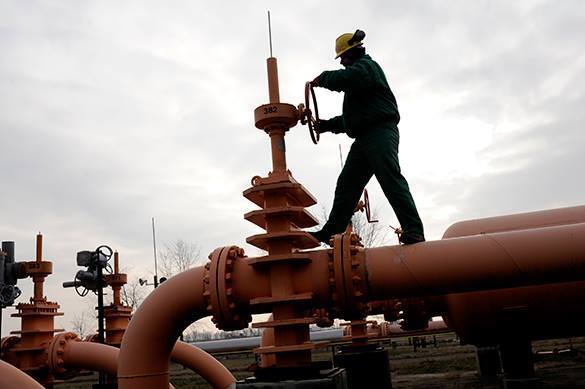Russian natural gas looks for ways to Europe bypassing failed state Ukraine
The United States and the pro-US lobby in the European Union have undermined the South Stream gas pipeline project on the bottom of the Black Sea, having caused concerns in a number of countries in Eastern Europe. These days, we can see the same people making every effort to block the construction of the Nord Stream-2 pipeline, albeit not very successfully. Is it because the cost of its construction (the total of 8 billion euros) appears to be a very small price to rid Europe of Ukraine's transit unpredictability?

The gas battle in Europe continues. In this battle, Washington and the pro-American lobby have two main objectives. The first one is to make Russia deliver the "blue fuel" to Europe, primarily via the territory of Ukraine. Secondly, as long as the possibility of uninterrupted gas transit is becoming more problematic, they are ready to deprive Europe of the Russian natural gas thus causing considerable damage to Gazprom.
An important victory for anti-Russian (including anti-European) forces was the actual blocking of the South Stream project. Now efforts are being taken to freeze the North Stream-2 project under the Baltic Sea. Yet, this task is too tough for Washington to deal with.
Recently, Nord Stream-2 Financial Director Paul Corcoran said at a meeting of the International Business Congress in St. Petersburg that the total cost of the construction of the new gas pipeline will make up the total of eight billion euros. The cost of gas transit through this pipeline will be half the price of the transit via Ukrainian pipelines.
Supplying gas via "great European power" of Ukraine
Accordingly, the gas supplied to Europe under the Baltic Sea, will definitely cost consumers a lot less than the natural gas that is still supplied to Europe via Ukraine. Yet, the head of the Italian oil and gas group ENI, Claudio Descalzi, has recently claimed that his fellow citizens, especially those residing in the south of Italy, may pay a higher price for the "blue fuel" supplied via Germany, although it is not really clear - a higher price compared to what?
If the official spoke about the transit of natural gas via Ukraine, then Gazprom has not announced an intention to to stop transiting Russian natural gas via the territory of Ukraine even after 2019, when the relevant contract expires.
The Italian official is obviously aware of the fact that gas supplies via the territory of the "great European power" of Ukraine was not always stable in the past. Nowadays, when the "great power" looks more like a "failed state", chances for uninterrupted gas supplies to Europe via Ukraine are slim.
Suffice it to recall the recent march of the Nazi punitive battalion "Azov," when they threatened to topple the current government, if the Minsk agreements are implemented. Members of this unit urged to explode the gas pipe to deprive the Russian aggressor of sources of income. As a result, Russia and its sober-minded European partners started taking efforts to build gas routes bypassing Ukraine.
Blocking the South Stream
Why did European leaders agree to block the South Stream while continuing to insist on the need to complete additional branches of the pipeline? Hungarian Foreign Minister Peter Siyyarto, for instance accused the EU administration of "double standards."
The Hungarian minister partially answered his own question by saying that the project of the pipeline bypassing Ukraine was economically unviable.
Indeed, the estimated cost of construction of the South Stream rose from the original 15 billion to 23 billion euros. The cost of the Nord Stream project is eight billion euros. This is definitely not viable.
Stable gas supplies to Europe via Ukraine would be the best option and no one doubts about that. However, one needs to meet a few requirements for that. These requirements, however, appear to be unreal under the current circumstances.
The presence of an international consortium with Russia's participation to maintain the dilapidated Ukrainian pipelines. Kiev does not have any money for that. Kiev politicians should not raise transit tariffs, which, in the long run, European consumers will have to pay for. Last but not least, the supposedly legitimate Ukrainian authorities should be able to keep the situation in the country under control to ensure, among many other things, the safety of gas pipelines.
Alas, this is only a dream because of the masochist policy of the European Union that approved the Maidan coup in Uktraine.
Yuri Nosovsky
Pravda.Ru
Read article on the Russian version of Pravda.Ru
Subscribe to Pravda.Ru Telegram channel, Facebook, RSS!


